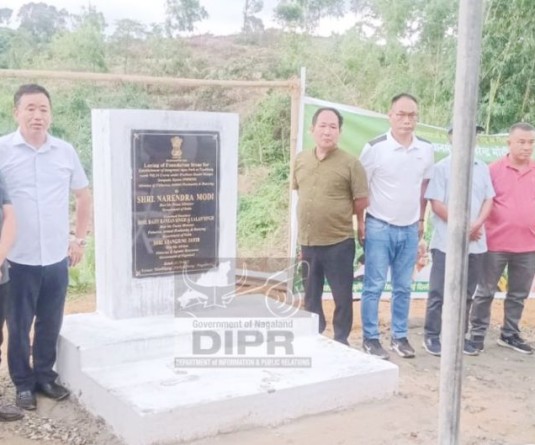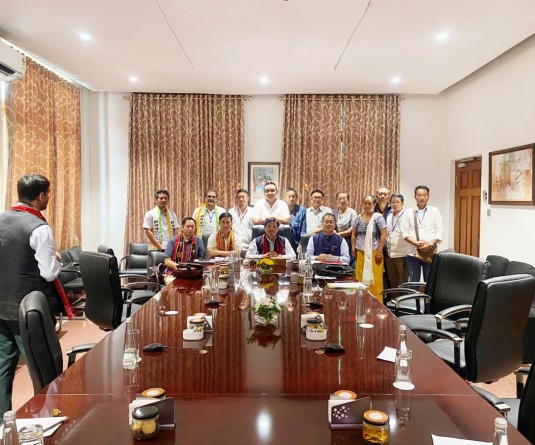Participants during the observance of Human Rights Day at NEN Resource Centre, Chizami on December 10. (Photo Courtesy: NEN)
Phek, December 10 (MExN): Culminating the 16 Days of Activism against Gender Based Violence (November 25-December 10), North East Network Nagaland in collaboration with Youth Department, Secheku Baptist Church Council (SBCC) observed Human Rights Day under the theme ‘Equality – Reducing inequalities, advancing Human Rights’ at NEN Resource Centre, VTC Hall, Chizami on December 10.
Setting the context for the introductory session, Seno Tsuhah, Honorary Member, NEN, elicited the unfortunate killings of 14 innocent civilians at Oting village, Mon district, by the Security Forces under the draconian law of Armed Forces Special Powers Act, 1958 (AFSPA).
A moment of silence was observed in solidarity to pay respect for the victims, stated a press release received here.
In her speech, Tsuhah asserted that “Human Rights is at the heart of Sustainable Development Goals (SDG). Without dignity, respect, peace, justice, we have no future.” She emphasized to Repeal AFSPA, an act that violates human rights, recounting killings of civilians in Oting. “All the young people need to wake up and reaffirm our commitment towards upholding the values and principles of human rights,” said Seno while stressing that Human Rights can be realized only if we have equality and non-discrimination at our own lives and homes.
A total of 59 participants from Zhavame, Porba, Razeba, Sumi, Chizami Town, Chizami village, Pholami, Gedemi, Enhulumi, Zelome and Baptist Theological College (BTC) Pfutsero attended the event.
‘Change always comes from the oppressed’
Speaking on the topic ‘Youth Leadership for Social Justice,’ Rev Dr Wati Longchar, Regional Consultant for Theological Education in East & South Asia of American Baptist Churches as the guest speaker highlighted the colonial mindset instilled in the minds of Nagas resulting in hindered progress amongst the youths by quoting, “Everyone is a leader and youths are Today’s leaders”, disapproving the old saying that - youths are tomorrow’s leaders.
Referring to the recent massacre of innocent lives of 14 civilians in Mon district the speaker emphasized on the importance of organized, collective and consistent protest and movements to attain social justice by having a concrete vision. “Change never come from the top, change always come from the oppressed,” remarked Longchar, underlining the significance of grassroot movements while criticizing the result gap by the competent authorities who are reluctant to solve problems. Longchar iterated on the need to acknowledge Dignity of Labour by stressing on the need for people to change attitudes and highlighted the wrong vocabulary and definition used for “School Drop-outs” by stating “new opportunities to start something”.
The second technical session commenced with film screening titled, “The story of Human Rights” by United Nations. Speaking on the topic ‘Sustainable Economic Development (SED),’ Longchar elucidated the highest number of unemployment figure of Nagaland and explained on the stereotypical and conventional mindsets of Nagas chasing “white-collared jobs, to become rich overnight, saying NO to transfer and withdrawing salaries from Kohima”.
Expounding the topic, Longchar, shared “SED is not about making individual profit, but revenue benefitting the whole community; it is development that protects the community land and resources; it is development that is owned by community and not by few corporations; it is development that respect people’s culture, identity and traditions”. “Be job providers and not job seekers,” stated Wati, while encouraging youths to tap natural and locally available resources viz. bamboo, wood, stones, and even reusing plastic waste to generate livelihood and employment opportunities for communities.
Citing example of a differently abled entrepreneur in Taiwan, Longchar illustrated different types of vocational occupation thriving in foreign countries restating the importance to deliver diverse and innovative business models firstly to create employment opportunities for the community and secondly to provide a transformative experience for tourists and guests.
In the discussion hour, some of the issues deliberated include: tapping of natural resources for creating livelihood opportunities through sustainable harvesting, economic justice in the Biblical context, importance of understanding holistic salvation and not only spiritual, etc.
Taking learning and pledging the way forward, Dr Khrotsolou from Baptist Christian College (BTC), Pfutsero emphasized on the importance of influencing Chakhesang Baptist Church Council (CBCC) to observe Human Rights Sunday so that village churches can follow suit in supporting the cause and can also collect offerings to support victims of such human rights violations.
Another participant remarked that he will return to his community and look into customary laws and traditions to challenge disempowering norms and practices in the community. Others pledged to say no to single use plastics, grow one’s own food in kitchen gardens and depend less on market food, adopt zero-plastic decorations during Christmas season, influence Church-run schools to impart life skills education to students, choosing the right leader in the next election.





